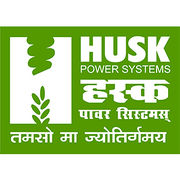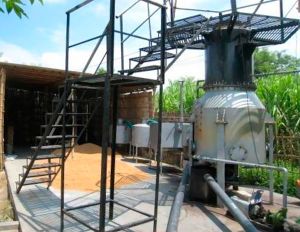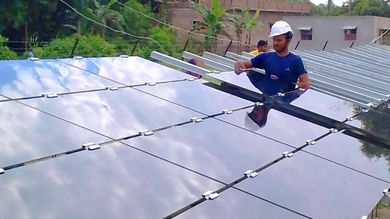Click here to register!
Difference between revisions of "Biomass and Solar PV Hybrid Minigrids for Off-Grid Farming Communities"
***** (***** | *****) |
***** (***** | *****) |
||
| Line 48: | Line 48: | ||
[[File:Husk Power Crop Model.jpg|thumb|left|300px|Husk Crop Model © Powering Agriculture]][[File:Power Husk Solar Panels.jpg|thumb|right|390px|Husk Solar Panels © Powering Agriculture]] | [[File:Husk Power Crop Model.jpg|thumb|left|300px|Husk Crop Model © Powering Agriculture]][[File:Power Husk Solar Panels.jpg|thumb|right|390px|Husk Solar Panels © Powering Agriculture]] | ||
| − | = Organization = | + | = Organization<br/> = |
Husk Power Systems (HPS) designs, installs, and operates biomass and solar photovoltaic (PV)-based power plants. HPS has partnered with Diamond Development Initiatives (DDI) in Nigeria, and Technology Management Group (TMG) in Ghana. DDI is a not-for-profit development service provider. TMG is an electrical contracting company that provides solutions for rural and urban electrification challenges.<ref name="Powering Agriculture: http://poweringag.org/innovators/biomass-solar-pv-hybrid-minigrids-grid-farming-communities">Powering Agriculture: http://poweringag.org/innovators/biomass-solar-pv-hybrid-minigrids-grid-farming-communities</ref><br/> | Husk Power Systems (HPS) designs, installs, and operates biomass and solar photovoltaic (PV)-based power plants. HPS has partnered with Diamond Development Initiatives (DDI) in Nigeria, and Technology Management Group (TMG) in Ghana. DDI is a not-for-profit development service provider. TMG is an electrical contracting company that provides solutions for rural and urban electrification challenges.<ref name="Powering Agriculture: http://poweringag.org/innovators/biomass-solar-pv-hybrid-minigrids-grid-farming-communities">Powering Agriculture: http://poweringag.org/innovators/biomass-solar-pv-hybrid-minigrids-grid-farming-communities</ref><br/> | ||
| + | |||
| + | <br/> | ||
| + | |||
| + | = Progress Update<br/> = | ||
| + | |||
| + | Husk Power has installed a new biomass gasification system in the Bagamoyo area of Tanzania, with a target customer base of 200 households, small businesses, and a couple of agro processing units. An order has been placed for 170kW of Solar Panels sufficient for 5 sites installation and grid tied inverters and physical structure for two sites. Husk Power’s goal is to convert this new biomass gasification site and another site at Kongwa, Tanzania, to a Hybrid mini-grid site (Solar PV + Biomass).<ref name="Powering Agriculture: http://poweringag.org/innovators/biomass-solar-pv-hybrid-minigrids-grid-farming-communities">Powering Agriculture: http://poweringag.org/innovators/biomass-solar-pv-hybrid-minigrids-grid-farming-communities</ref><br/> | ||
<br/> | <br/> | ||
| Line 73: | Line 79: | ||
<references /> | <references /> | ||
| + | [[Category:Powering_Agriculture]] | ||
| + | [[Category:Mini-grid]] | ||
[[Category:Photovoltaic_(PV)]] | [[Category:Photovoltaic_(PV)]] | ||
| − | |||
| − | |||
Revision as of 13:47, 21 November 2017
Overview
|
Innovator |
||
|
Project |
Biomass and Solar PV Hybrid Minigrids for Off-Grid Farming Communities | |
|
Collaborators |
Diamond Development Initiatives (Nigeria) | |
|
Location Applied |
Rural, off-grid communities in Ghana and Nigeria that rely on solar PV systems are limited in their hours of agricultural operations and access to electricity. Diesel generators and battery back-ups are expensive to operate, so operations are limited to a single shift.[1]
Clean Energy Solution
Husk Power will install a hybrid solution that combines a biomass gasification system with a solar PV system. The biomass plant uses a proprietary downdraft gasification technology that converts abundant agricultural residue into electricity. The system will power a mini-grid that produces electricity for residential, as well as agricultural, needs. The electricity is distributed to rural households and micro-enterprises through a mini-grid system—providing a better quality, cheaper way to meet their need for energy. Agricultural uses that will be powered include irrigation pumps, agro-processing mills, and drying and heating processes. The biomass plant converts abundant agricultural residue, such as maize cobs, rice husks, coffee husks, and cotton stalks, into electricity.[1]
Impact
The hybrid plant uses a combination of solar and biomass—both abundant resources in the communities selected for installation. Agricultural operations will be able to continue processing during nighttime hours, as the biomass plant will provide power when the solar PV system is not operating.[1]
Organization
Husk Power Systems (HPS) designs, installs, and operates biomass and solar photovoltaic (PV)-based power plants. HPS has partnered with Diamond Development Initiatives (DDI) in Nigeria, and Technology Management Group (TMG) in Ghana. DDI is a not-for-profit development service provider. TMG is an electrical contracting company that provides solutions for rural and urban electrification challenges.[1]
Progress Update
Husk Power has installed a new biomass gasification system in the Bagamoyo area of Tanzania, with a target customer base of 200 households, small businesses, and a couple of agro processing units. An order has been placed for 170kW of Solar Panels sufficient for 5 sites installation and grid tied inverters and physical structure for two sites. Husk Power’s goal is to convert this new biomass gasification site and another site at Kongwa, Tanzania, to a Hybrid mini-grid site (Solar PV + Biomass).[1]
Further Reading
- Powering Agriculture Portal on energypedia
- Powering Agriculture Homepage, Winners/ Innovators
- Powering Agriculture: An Energy Grand Challenge for Development
- Powering Agriculture Newsletters
- Ghana Energy Situation
- Nigeria Energy Situation
- Website Husk Power Systems
- Website Diamond Development Initiatives
- Website Technology Management Group






















